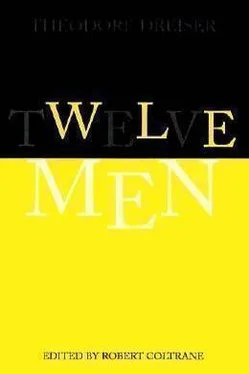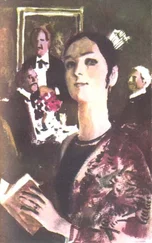Теодор Драйзер - Twelve Men
Здесь есть возможность читать онлайн «Теодор Драйзер - Twelve Men» весь текст электронной книги совершенно бесплатно (целиком полную версию без сокращений). В некоторых случаях можно слушать аудио, скачать через торрент в формате fb2 и присутствует краткое содержание. Год выпуска: 2014, Издательство: epubBooks Classics, Жанр: Биографии и Мемуары, на английском языке. Описание произведения, (предисловие) а так же отзывы посетителей доступны на портале библиотеки ЛибКат.
- Название:Twelve Men
- Автор:
- Издательство:epubBooks Classics
- Жанр:
- Год:2014
- ISBN:нет данных
- Рейтинг книги:4 / 5. Голосов: 1
-
Избранное:Добавить в избранное
- Отзывы:
-
Ваша оценка:
- 80
- 1
- 2
- 3
- 4
- 5
Twelve Men: краткое содержание, описание и аннотация
Предлагаем к чтению аннотацию, описание, краткое содержание или предисловие (зависит от того, что написал сам автор книги «Twelve Men»). Если вы не нашли необходимую информацию о книге — напишите в комментариях, мы постараемся отыскать её.
Twelve Men — читать онлайн бесплатно полную книгу (весь текст) целиком
Ниже представлен текст книги, разбитый по страницам. Система сохранения места последней прочитанной страницы, позволяет с удобством читать онлайн бесплатно книгу «Twelve Men», без необходимости каждый раз заново искать на чём Вы остановились. Поставьте закладку, и сможете в любой момент перейти на страницу, на которой закончили чтение.
Интервал:
Закладка:
"You think you're smart, don't you?" he said sourly and without any preliminary statement as to how he knew we had done it in less time. "You come out here and pay me one hundred a week and then you want to be cute and play tricks with your own money and health. I want you to remember just one thing: my reputation is just as much involved with the results here as your money. I don't need anybody's money, and I do need my orders obeyed. Now you all have watches. You just time yourselves and do that block in the time required. If you can't do it, that's one thing; I can forgive a man too weak or sick to do it. But I haven't any use for a mere smart aleck, and I don't want any more of it, see?"
That luncheon was very sad.
Another thing in connection with these luncheons and dinners, which were sharply timed to the minute, were these crisp table speeches, often made in re some particular offender or his offense, at other times mere sarcastic comments on life in general and the innate cussedness of human nature, which amused at the same time that they were certain to irritate some. For who is it that is not interested in hearing the peccadilloes of his neighbor aired?
Thus while I was there, there was a New York society man by the name of Blake, who unfortunately was given to severe periods of alcoholism, the results of which were, after a time, nervous disorders which sent him here. In many ways he was as amiable and courteous and considerate a soul as one could meet anywhere. He had that smooth, gracious something about him—good nature, for one thing, a kind of understanding and sympathy for various forms of life—which left him highly noncensorious, if genially examining at times. But his love of drink, or rather his mild attempts here to arrange some method by which in this droughty world he could obtain a little, aroused in Culhane not so much opposition as an amused contempt, for at bottom I think he really liked the man. Blake was so orderly, so sincere in his attempts to fulfill conditions, only about once every week or so he would suggest that he be allowed to go to White Plains or Rye, or even New York, on some errand or other—most of which requests were promptly and nearly always publicly refused. For although Culhane had his private suite at one end of the great building, where one might suppose one might go to make a private plea, still one could never find him there. He refused to receive complaints or requests or visits of any kind there. If you wanted to speak to him you had to do it when he was with the group in its entirety—a commonsense enough policy. But just the same there were those who had reasonable requests or complaints, and these, by a fine intuition as to who was who in this institution and what might be expected of each one, he managed to hear very softly, withdrawing slowly as they talked or inviting them into the office. In the main however the requests were very much like those of Blake—men who wanted to get off somewhere for a day or two, feeling, as they did after a week or two or three, especially fit and beginning to think no doubt of the various comforts and pleasures which the city offered.
But to all these he was more or less adamant. By hook or by crook, by special arrangements with friends or agents in nearby towns and the principal showy resorts of New York, he managed to know, providing they did leave the grounds, either with or without his consent, about where they were and what they had done, and in case any of his rules or their agreements were broken their privileges were thereafter cut off or they were promptly ejected, their trunks being set out on the roadway in front of the estate and they being left to make their way to shelter elsewhere as best they might.
On one occasion, however, Blake had been allowed to go to New York over Saturday and Sunday to attend to some urgent business, as he said, he on his honor having promised to avoid the white lights. Nevertheless he did not manage so to do but instead, in some comfortable section of that region, was seen drinking enough to last him until perhaps he should have another opportunity to return to the city.
On his return to the "shop" on Monday morning or late Sunday night, Culhane pretended not to see him until noonday lunch, when, his jog over the long block done with and his bath taken, he came dapperly into the dining–room, wishing to look as innocent and fit as possible. But Culhane was there before him at his little table in the center of the room, and patting the head of one of the two pure–blooded collies that always followed him about on the grounds or in the house, began as follows:
"A dog," he said very distinctly and in his most cynical tone and apparently apropos of nothing, which usually augured that the lightning of his criticism was about to strike somewhere, "is so much better than the average man that it's an insult to the dog to compare them. The dog's really decent. He has no sloppy vices. You set a plate of food before a regularly–fed, blooded dog, and he won't think of gorging himself sick or silly. He eats what he needs, and then stops. So does a cat" (which is of course by no means true, but still—). "A dog doesn't get a red nose from drinking too much." By now all eyes were turning in the direction of Blake, whose nose was faintly tinged. "He doesn't get gonorrhea or syphilis." The united glances veered in the direction of three or four young scapegraces of wealth, all of whom were suspected of these diseases. "He doesn't hang around hotel bars and swill and get his tongue thick and talk about how rich he is or how old his family is." (This augured that Blake did such things, which I doubt, but once more all eyes were shifted to him.) "He doesn't break his word. Within the limits of his poor little brain he's faithful. He does what he thinks he's called upon to do.
"But you take a man—more especially a gentleman—one of these fellows who is always very pointed in emphasizing that he is a gentleman" (which Blake never did). "Let him inherit eight or ten millions, give him a college education, let him be socially well connected, and what does he do? Not a damned thing if he can help it except contract vices—run from one saloon to another, one gambling house to another, one girl to another, one meal to another. He doesn't need to know anything necessarily. He may be the lowest dog physically and in every other way, and still he's a gentleman—because he has money, wears spats and a high hat. Why I've seen fifty poor boob prize fighters in my time who could put it all over most of the so–called gentlemen I have ever seen. They kept their word. They tried to be physically fit. They tried to stand up in the world and earn their own living and be somebody." (He was probably thinking of himself.) "But a gentleman wants to boast of his past and his family, to tell you that he must go to the city on business—his lawyers or some directors want to see him. Then he swills around at hotel bars, stays with some of his lady whores, and then comes back here and expects me to pull him into shape again, to make his nose a little less red. He thinks he can use my place to fall back on when he can't go any longer, to fix him up to do some more swilling later on.
"Well, I want to serve notice on all so–called gentlemen here, and one gentleman in particular" (and he heavily and sardonically emphasized the words), "that it won't do. This isn't a hospital attached to a whorehouse or a saloon. And as for the trashy little six hundred paid here, I don't need it. I've turned away more men who have been here once or twice and have shown me that they were just using this place and me as something to help them go on with their lousy drinking and carousing, than would fill this building. Sensible men know it. They don't try to use me. It's only the wastrels, or their mothers or fathers who bring their boys and husbands and cry, who try to use me, and I take 'em once or twice, but not oftener. When a man goes out of here cured, I know he is cured. I never want to see him again. I want him to go out in the world and stand up. I don't want him to come back here in six months sniveling to be put in shape again. He disgusts me. He makes me sick. I feel like ordering him off the place, and I do, and that's the end of him. Let him go and bamboozle somebody else. I've shown him all I know. There's no mystery. He can do as much for himself, once he's been here, as I can. If he won't, well and good. And I'm saying one thing more: There's one man here to whom this particularly applies today. This is his last call. He's been here twice. When he goes out this time he can't come back. Now see if some of you can remember some of the things I've been telling you."
Читать дальшеИнтервал:
Закладка:
Похожие книги на «Twelve Men»
Представляем Вашему вниманию похожие книги на «Twelve Men» списком для выбора. Мы отобрали схожую по названию и смыслу литературу в надежде предоставить читателям больше вариантов отыскать новые, интересные, ещё непрочитанные произведения.
Обсуждение, отзывы о книге «Twelve Men» и просто собственные мнения читателей. Оставьте ваши комментарии, напишите, что Вы думаете о произведении, его смысле или главных героях. Укажите что конкретно понравилось, а что нет, и почему Вы так считаете.









